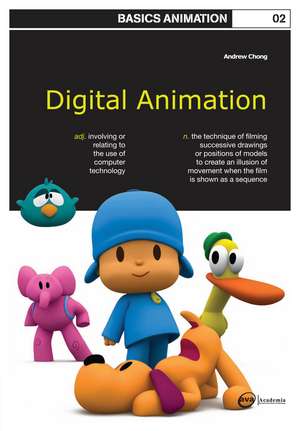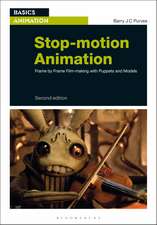Digital Animation: Basics Animation
Autor Andrew Chongen Limba Engleză Paperback – 19 oct 2007
Preț: 163.11 lei
Preț vechi: 186.32 lei
-12% Nou
Puncte Express: 245
Preț estimativ în valută:
31.21€ • 32.67$ • 25.83£
31.21€ • 32.67$ • 25.83£
Carte tipărită la comandă
Livrare economică 05-19 aprilie
Preluare comenzi: 021 569.72.76
Specificații
ISBN-13: 9782940373567
ISBN-10: 2940373566
Pagini: 176
Ilustrații: 200 colour illus
Dimensiuni: 160 x 230 x 20 mm
Greutate: 0.52 kg
Editura: Bloomsbury Publishing
Colecția Ava Publishing
Seria Basics Animation
Locul publicării:London, United Kingdom
ISBN-10: 2940373566
Pagini: 176
Ilustrații: 200 colour illus
Dimensiuni: 160 x 230 x 20 mm
Greutate: 0.52 kg
Editura: Bloomsbury Publishing
Colecția Ava Publishing
Seria Basics Animation
Locul publicării:London, United Kingdom
Caracteristici
Discusses the application of digital animation techniques to a variety of formats, including cinema, television, and games
Notă biografică
Andrew Chong is a graduate of Newcastle Polytechnic. He has worked as a freelancer in commercial video and broadcast television, and his assignments range from prop making through to computer graphics and live action video. He currently works at Loughborough University's Animation Academy under the direction of Professor Paul Wells, facilitating various research projects, from stop-frame animation to motion-capture.
Cuprins
Introduction. How to get the most out of this book. Foundations <1960: Early mechanical developments; The first animated films; The foundation of modern computing. Pioneers 1960-1980: Experimental animators; Early special effects; The birth of computer games; First CGI in cimena; GUIs and SIMs. Development 1980-1990: The first digital games; The animator's role; CGI aesthetics; Character animation; Computers for everyone; Digitally animated shorts; Digital animation in fine arts; Photorealism. Maturity 1990-2000: The internet and animation; Digital animation in cinema; Digital animation in television; Traditional skills in CGI; Digital worlds and digital actors. Integration 2000-2007: Digital tools for all; Digital feature films; Digital auteurism; Media crossover; Aesthetic confidence; Beyond cinema and television. Predictions 2007>: Machinima; Return to core values; Digital auteurism revisited. Glossary. A timeline of digital animation. Conclusion. References and bibliography. Further resources. Acknowledgements. Picture credits.
Recenzii
An excellent and contemporary survey of the genre.
Clear, concise, well illustrated and appropriate for an introduction to the subject.
I think it will fill in the gaps in my students' knowledge. It is good to see a general book that is not software specific.
Bite size information, easy to digest and with great examples. Glossary and timeline at the back of the book was very useful ... Images are well presented, text is easily read.
I think the book is a work of art on its own. The graphic layout is really something.
I thought the book covered the subject very comprehensively, highlighting some of the key breakthroughs with this technology in the industry.
The book is exactly what I had been hoping for, as it provides a solid overview on the history of digital animation.
Now living in a digital era, Andrew Chong's book offers up-to-date and valuable information on current technology and digital production methods. The book takes you through the history of animation production to current trends and innovative methods - information that would be of extreme value to any student wishing to work in today's animation industry.
I think the book is a good starting point for a beginners' course on the subject. The historical approach is really well documented.
Clear, concise, well illustrated and appropriate for an introduction to the subject.
I think it will fill in the gaps in my students' knowledge. It is good to see a general book that is not software specific.
Bite size information, easy to digest and with great examples. Glossary and timeline at the back of the book was very useful ... Images are well presented, text is easily read.
I think the book is a work of art on its own. The graphic layout is really something.
I thought the book covered the subject very comprehensively, highlighting some of the key breakthroughs with this technology in the industry.
The book is exactly what I had been hoping for, as it provides a solid overview on the history of digital animation.
Now living in a digital era, Andrew Chong's book offers up-to-date and valuable information on current technology and digital production methods. The book takes you through the history of animation production to current trends and innovative methods - information that would be of extreme value to any student wishing to work in today's animation industry.
I think the book is a good starting point for a beginners' course on the subject. The historical approach is really well documented.
Descriere
Digital Technology has made the production of animation simpler, faster and more widely available than at any time in cinema history. This title looks at the history of the medium charting its progress with references to specific examples, which demonstrate the growth and development of the form.
























